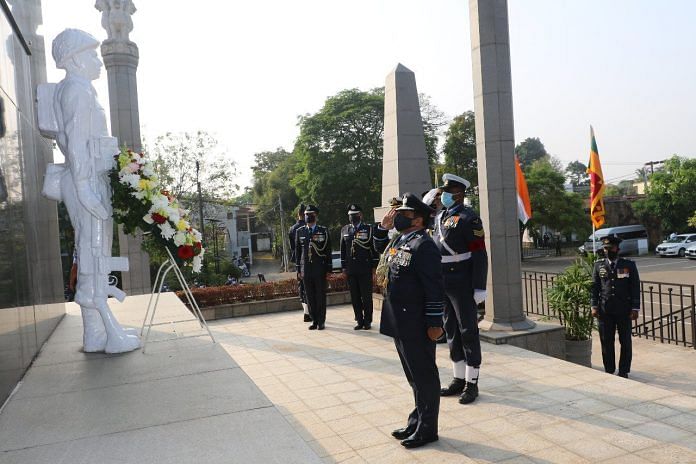The first time Indian military set sail from the Indian shores was the Cholas in 1100 AD and they went on to conquer Sri Lanka and many parts of Southeast Asia. Nearly a thousand years later, in 1987, another force under the Indian flag sailed from India to bring peace to a conflict-ridden Sri Lanka. It was termed the Indian Peace Keeping Force.
It has been 34 years since the first IPKF soldier landed on Sri Lankan soil on 30 July 1987, the very next day after the Indo-Sri Lanka Peace Accord was signed. We lost over 1,200 men in the line of duty, yet it has taken successive Indian governments over three decades to recognise the sacrifices of its soldiers.
A nation that does not honour its fallen heroes dishonours itself. Belated as it may be, the Narendra Modi government’s decision to permit the initiative of numerous stakeholders to commemorate the anniversary of the IPKF operation with a wreath-laying ceremony at the National War Memorial to take place on 29 July has sent a reassuring and welcome message to the soldiers, and the families of those who lost their lives while simply carrying out their duty.
Also Read: 30 years of IPKF: From finding rebel camps in Tamil Nadu to checking on friends in Colombo
Change in Sri Lankan political landscape
Sri Lanka’s political landscape had changed in the 1980s. It had become a theocratic Buddhist state with a 75 per cent Sinhala population. Meanwhile, the 18 per cent Tamil minority was politically, economically and socially suppressed. The Indian Government, headed by Prime Minister Rajiv Gandhi, was under great political pressure from the 4.8 crore population in Tamil Nadu to intervene.
He coerced the Sri Lankan president at the time, Junius Richard Jayewardene, at a metaphoric gun-point by a show of airpower projection: Operation Poomalai. This forced him to sign the Indo-Sri Lanka Peace Accord.
This meant that the Tamil majority residing on 19,000 square kilometres of land on the Northern and Eastern provinces would now be merged into one North-Eastern province. There would also be a change in the legislative structure of the nation to a federal structure from the Westminster model.
The impracticable nature of the Accord comes from its demographic implications of giving the minority Tamils constituting 19 per cent of the population as much as 33 per cent of the total land area of the country; and that too, the most fertile part. It was therefore not difficult to predict that the Accord was doomed to fail, despite being praised as a diplomatic masterclass in India. The IPKF was created to make military force available to Sri Lanka’s president during the implementation of the Accord.
Also Read: 1962, IPKF to Balakot, Ladakh – India’s record in writing factual military history is poor
Why was IPKF fighting?
Many ask why we were fighting when it was a peace-keeping role. To ask a soldier why they were fighting in Sri Lanka reminds me of the Battle of Balaclava during the 1853 Crimean War. When the British general, James Thomas Brudenell, (later made Lord Cardigan) ordered an attack on the Russian forces for the seemingly impossible task of capturing Crimean heights, he is said to have told his men “Ours is not to question why, ours is to do and die”. He succeeded and was made immortal through Alfred Tennyson’s famous poem: Charge of the Light Brigade. In India, decisions are made in New Delhi; the soldiers just obey them.
The IPKF took on a more hands-on role for peacekeeping in Sri Lanka, owing to the civil war between military-backed Sinhalese mobs and Liberation Tigers of Tamil Eelam (LTTE) representing the Tamil community. Its military operations became necessary to cool down the searing tensions and unrest. Keeping peace at all costs was the motto. Once the situation was better, the force also helped with organising and executing elections in the newly formed North-Eastern provinces.
The IPKF had been authorised by the government as a joint forces command where the Air Force and Navy played a major role. The Army strength was gradually built up to a five Divisions size force.
Also Read: 28 years after Rajiv Gandhi’s death, a look back at the LTTE-Lanka nexus that killed him
Mission accomplished for the IPKF
The Provincial elections were conducted in November 1988. On 10 December 1988, the duly elected Chief Minister of the North Eastern Provincial Council, Annamalai Varadaraja Perumal, was sworn in by the president. On the same day, I intimated my government in New Delhi: ‘Mission Accomplished’, awaiting further orders. The reply from New Delhi is another tale that I will leave for another occasion.
As mentioned earlier, (some facts need reiteration) in carrying out its mission IPKF lost over 1,200 officers and soldiers. It enabled elections to be held in Sri Lanka and the creation of a merged Tamil majority North-Eastern Province to fulfil the aspirations of the Tamil population in Sri Lanka.
Regrettably, until now, successive governments in India have failed to recognise the sacrifices of its fallen heroes when monuments are built for all and sundry. Today is a day of joy and happiness for the kin of the fallen when the present government has permitted us to commemorate the anniversary of IPKF arriving in Sri Lanka. I and my colleagues who fought under the IPKF are grateful for the gesture.
The author is a former Commander of the IPKF. Views are personal.
Correction: An earlier version of this article incorrectly described the role of the Air Force and Navy in IPKF as ‘limited’. The statement has been amended by the author to reflect their contribution.
(Edited by Srinjoy Dey)



